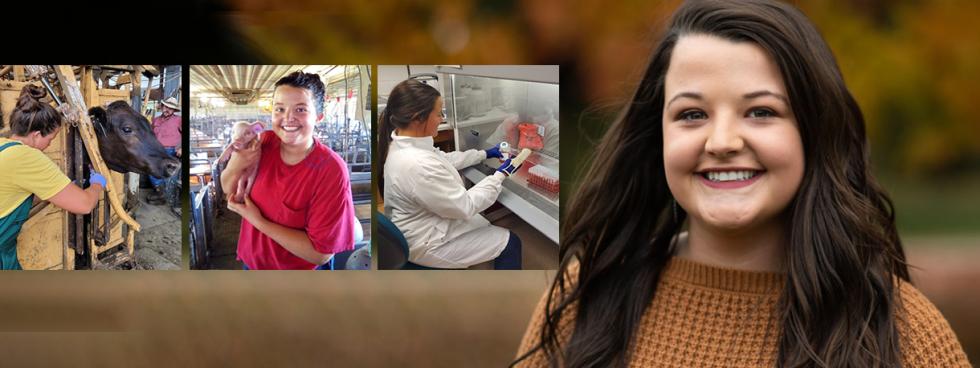
Dual Internships
Growing up on a 200-sow farrow to finish farm in southeast Iowa, you would think McKenna Brinning would naturally gravitate to swine medicine as a veterinary medicine student.
Then again, her grandfather owns a cow-calf operation.
“As a young girl, I had the opportunity to exhibit cattle and swine in 4-H and FFA,” said Brinning, a third-year veterinary medicine student. “This is really where my passion for both swine and beef started.”
So, a year after completing a summer in the College of Veterinary Medicine’s Swine Veterinary Internship Program (SVIP), she had to give beef medicine equal billing.
“This summer I am a BVIP (Bovine Veterinary Internship Program) intern,” Brinning said. “With my background, I knew I wanted to gain experience in all aspects of large animal medicine. These internships have broadened my experiences in both swine and beef fields of veterinary medicine.”
SVIP and BVIP give veterinary students like Brinning the opportunity to collaborate with leading veterinarians in this industry. Students not only learn the principles of beef or swine herd health management but designing and executing field research.
In the summer of 2021, Brinning was a SVIP intern at Smithfield Hog Production. She spent some of her days traveling to finishers and nurseries in Iowa helping start off nursery-pigs, evaluating health-challenged herds, and helping diagnose and treat pigs. Brinning also designed and executed field research at an 8,500-head sow farm, evaluated a rotavirus vaccine given pre-farrowing and how that affected suckling pigs.
“I learned a lot through this research,” she said, “especially how to know what ‘good’ research designs look like.”
At the conclusion of her internship, she presented the research at the National American Association of Swine Veterinarians conference.
Her SVIP experience was so educational, Brinning decided to make it two years in a row with the program, but this time doing a BVIP internship. This past summer she interned in the Veterinary Field Services unit and traveled to various health calls.
This internship has given Brinning the opportunity to assist with surgeries in the field, help write health papers, and assist with check-ins of livestock at various county fairs. She is also researching Anaplasmosis cases in Iowa bovine herds as well as evaluating Bovine Respiratory Disease cases and how treatment history impacts antimicrobial susceptibility.
“There are four different veterinarians on staff I have had the opportunity to ride along with and learn from each of them,” Brinning said. “All the veterinarians are great teachers and I have gained much knowledge and hands-on skills that I know I will use in my practice.”
That real-world experience is another reason why she participated in the two internship programs.
“My favorite thing about both internships was the real-world skills I learned and the networking I did along the way,” Brinning said. “Having grown up on a farm, I know how crucial it is to get hands-on experience your first two summers of vet school and I accomplished just that through my internships.”
July 2022
